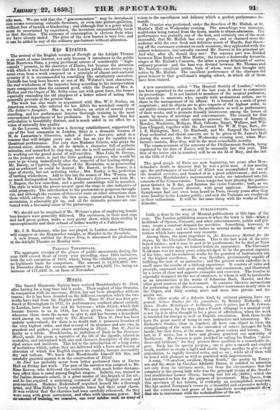4tairts.
The revival of the English version of Tartufe at the Adelphi Theatre is an event of some interest, not only because it introduces to the public Miss Henrietta Sims, a young provincial actress of considerable " high- comedy " promise, in the character of Vlmire, but because the attention with which it was heard shows that the London public can derive enjoy- ment even from a work composed on a principle of almost anti-national severity if it is recommended by something like satisfactory execution. Tartu& has long been known as one of Mr. Webster's best characters, the real wickedness of the impostor being according to his interpretation more conspicuous than the assumed good, while the Dorixie of Mrs. A. Mellon and the Orgon of Mr. Selby come out with great force, the former especially reminding the old playgoer of a better school of acting than generally prevails at the present time. The week has also made us acquainted with Mrs. W. C. Forbes, an American actress, who selected for her debt the wretched comedy of The Soldier's Daughter. She is, we believe, an artist of several years standing, and her performance denotes thorough training in the most conventional department of her profession. It may be added that her articulation is beautifully distinct, and is much aided in its effect by a voice of naturally fine quality. At the Lyceum, which is now a thriving establishment, supported by one of the best companies in London, there is a dramatic version of M. de Lamartine's GOnevieve, called A Sister's Sacrifice, acted in a manner that will delight every one who has an eye for equality in a theatrical performance. Not only does Madame Celeste, who plays the devoted sister, delineate in all its details a character full of pathetic rainuthe, and unmarked by clap-trap, but she is well assisted on all sides in working out the grand moral of self-sacrifice. Miss julia St. George, as the younger sister, is just the little gushing creature, who would be sure to go wrong immediately after the removal of her leading-strings ; Mr. Emery, as Cyprien, the Cymon of the Mountains, is as persevering and as awkward as could be desired; Mr. Barrett, as the farmer, is a type of sturdy, but not unfeeling virtue ; Mrs. Keeley is the perfection of tattling wickedness. Add to this list the names of Mrs. Weston, who so much distinguished herself in Mr. Falconer's Extremes, and little Mr. J. Rogers, the low comedian, and a goodly assemblage will be manifest. The style in which the pieces are put upon the stage is also indicative of solid prosperity. The introduction to the pantomime is gorgeous through- out, and although the version of Gineviive rests on other attractions than those which address the eye, the last scene, representing a farm in the mountains, is admirably got up, and all the dramatis personae are cos- tumed with a becoming sense of the picturesque.






























 Previous page
Previous page